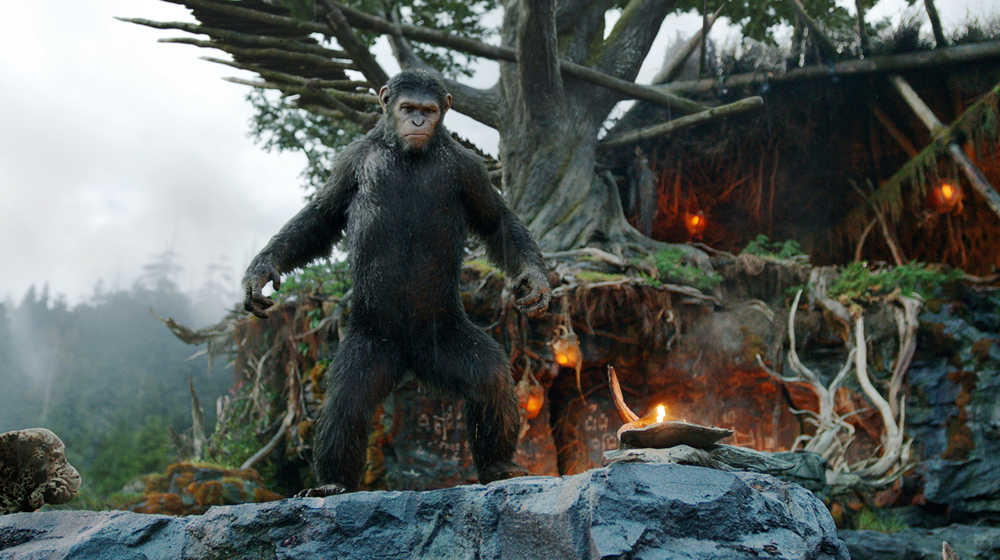“Dawn of the Planet of the Apes”
Twentieth Century Fox
2 hours, 10 minutes
One of the pop-culture blogs I read recently did a feature listing all of the “Planet of the Apes” movies in order of how much of a “bummer” the ending was. This was kind of funny, but it really served to remind me of two things: one, that almost all of the “Apes” movies, released from 1968-1973 are schlocky, low-budget affairs (not counting the original which is a certified masterpiece), and two, how remarkable it is that these more recent iterations (not counting Tim Burton’s version which is certified junk) are so good.
2011’s “Rise of the Planet of the Apes” was an excellent movie, not only as a genre film, but as a well rounded, well thought out, well executed cinematic tale. The story of genetically enhanced apes, recipients of an Alzheimer’s cure gone awry, and how they escape humanity all the while ushering in a global pandemic is both fast-paced and methodical.
This week’s highly anticipated sequel, “Dawn of the Planet of the Apes,” accomplishes the seemingly impossible task of besting the original, balancing emotional heft and an action-packed plot to create a brilliant film.
When we left off, Caesar, the first in a line and the leader of a colony of intelligent apes, has created a peaceful society in the rainforests outside of what was once San Francisco. It has now been more than ten years since the so-called Simian Flu wiped out nearly the entire human population of the world.
Things seem well, but the burdens of leadership weigh on our hero. Caesar’s son Blue Eyes is struggling to balance wisdom and action, and his second in command, the hideously scarred and emotionally damaged Koba, is beginning to chafe under domestic tranquility.
He needn’t worry for long. One day Blue Eyes and his friend Ash, son of Rocket (who you may remember from the first film as the whitish chimpanzee who bullies Caesar at first) are out scouting the area when they happen across a group of humans hiking through the underbrush. One has a gun and, spooked, he shoots Ash, wounding him.
This confrontation reveals to the apes that the few human survivors, far from fading away quietly, have been attempting to rebuild society on top of the ruins of their once proud city. A necessary component for this rebirth is the re-establishment of electrical power by reactivating a nearby hydroelectric dam. Unfortunately for all involved, access to said dam goes right through the apes’ territory. The inevitable culture clash could be enough to rip apart whatever fragile progress either group has made.
As impressed as I was with the first film in this new series, I was doubly impressed here. The confidence and patience involved in this story is supreme. Director Matt Reeves is content to let the tension and drama build naturally without any artificial push to a splashy climax. The characters are all fully fleshed out, and the fact that most of them are also fully furred makes no difference.
Andy Serkis, once again playing Caesar, is brilliant, able to convey the weight of the world through all those pixels. Also very good are Jason Clarke, as Caesar’s human counterpart, working to build a peace that is all but impossible, and Gary Oldman as Clarke’s partner, but less impressed with the apes’ capacity for compassion and intelligence.
The greatest feat of these films, this one in particular, is that it makes the ridiculous premise of talking, horse-riding, gun-toting chimpanzees believable — so much so that you begin to forget how strange it all is. I did feel that the film’s big emotional climax lacked a little of the punch it was going for, if only because it seemed inevitable, but this is a minor complaint. “Dawn of the Planet of the Apes” is one of the best examples of genre filmmaking I’ve ever seen and one of best films of the year.
Grade: A
“Dawn of the Planet of the Apes” is rated PG-13 for action violence and mature themes.
Speaking of mature themes, I was early to my screening of “Apes” and decided to sneak in and watch the first fifteen minutes or so of the new “Transformers” movie. If there were any group of films that was the absolute antithesis of all that I’ve written here it would be Michael Bay’s despicable giant robot series. In just a few minutes I was treated to Bay’s trademark bombastic cinematography where each new character is introduced, shot from below with a swirling dramatic camera shot. The little dialogue I heard was awful, but worst of all was the treatment of a blond teen bombshell who Bay takes pains to film in as lascivious a way as possible all the while having the script decry her lack of conservative sensibilities. It was more than a little disgusting. Luckily a good movie was starting, so I didn’t have to endure it for very long.
Chris Jenness is a freelance graphic designer, artist and movie buff who lives in Nikiski.

